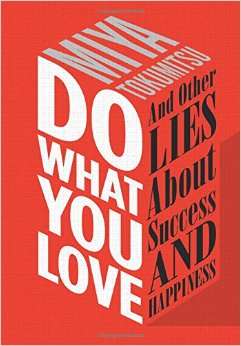DO WHAT YOU LOVE and Other Lies About Success and Happiness by Miya Tokumitsu
 Miya Tokumitsu never imagined when she wrote the article, “In the Name of Love” for JacobinMag.com that it would be picked up by Slate and quickly become an internet sensation. Since then, Tokumitsu has written DO WHAT YOU LOVE and Other Lies About Success and Happiness (Regan Arts, August 2015) in order to help other people realize where work and life should begin and end. Understanding that the mantra, “Do What You Love,” is sending out mixed signals to those entering the work force is something we, as a society, should become much more aware of. But most importantly, what Tokumitsu wants every working person to realize is that giving your all to your job doesn’t necessarily make you a better employee. Having a healthy balance of work and other things in life, such as passions and hobbies, is when you are at your best.
Miya Tokumitsu never imagined when she wrote the article, “In the Name of Love” for JacobinMag.com that it would be picked up by Slate and quickly become an internet sensation. Since then, Tokumitsu has written DO WHAT YOU LOVE and Other Lies About Success and Happiness (Regan Arts, August 2015) in order to help other people realize where work and life should begin and end. Understanding that the mantra, “Do What You Love,” is sending out mixed signals to those entering the work force is something we, as a society, should become much more aware of. But most importantly, what Tokumitsu wants every working person to realize is that giving your all to your job doesn’t necessarily make you a better employee. Having a healthy balance of work and other things in life, such as passions and hobbies, is when you are at your best.
BookTrib had the pleasure of speaking with Miya Tokumitsu and she shed some light on how she came to such a specific realization.
BOOKTRIB: Were you surprised that the JacobinMag.com article went viral like it did?
MIYA TOKUMITSU: I was completely surprised. Before the article I wasn’t an established name, so it’s just very disorienting to go from being a somewhat private person to having writing circulate so widely. I was surprised but I really think that it shows the extent perhaps to which people have been kind of suffering in silence with this “Do what you love” thought process. And watching it all happen, it felt like to some people it was a big relief [that I was saying what other people were thinking].
BT: Can you explain what this book is about at its core?
MT: I think it’s a little funny and unintuitive because, despite the title, I really wanted it to be a book that was encouraging and empowering to workers. At its core this message, “Do what you love,” is very deceptive because it’s the opposite of my book in that it sounds really encouraging and supportive, but it’s actually the opposite. This mantra—and it’s not just a mantra that people repeat verbally or in text, but it has this whole visual culture around it as well, where people like Steve Jobs are held up [on a pedestal] and it’s not just the idea of Steve Jobs, but the whole thing with his turtle neck and his jeans. He presents a very specific vision of what a kind of blissful, successful worker looks like. I really wanted to unpack the ways in which I think these tropes haven’t been entirely empowering to workers. But I always wanted to make sure I was doing it respectfully and thoughtfully, because I really do respect how hard so many people are working.
BT: What audience are you hoping to capture with this book?
MT: The general working class, I think. That’s why I wanted to discuss such a range of workers in the book. I didn’t want it to just be about academia or just be about blue collar work or just be about professional work. I think it might be something to think about for people at all different stages of their career, but perhaps especially to those at the beginning of their working life; those coming out of college and thinking about, or not thinking about, what kind of plans they’re going to be making in terms of their work and how they might protect themselves. That’s something that especially people coming out of college who are told, “Every door is open to you. You can do anything,” don’t really think about what they need to do to make sure they’re not being taken advantage of in the work space.
BT: Have you found that changing the way you look at work and life has been difficult? Or that getting other people to see it the way that you do is met with opposition?
MT: I do think it has changed the way I look at it. I’m an academic. I have my Ph.D. in Art History, I do research, I teach and I actually found it to be really liberating once I was able to compartmentalize parts of my life. Success in one area is just success in one area. There are other things I want to achieve in other parts of my life and other interests that I want to develop. It can be really freeing in that way and I think before I really kind of took this turn, I fell into this trap that a lot of people, especially graduate students, fall into which is that you think your whole life depends upon how you perform in this one very specific arena and that that’s your identity.
BT: Do you think there a balance that you believe can exist between hard-work and success?
MT: There is a balance. I really respect hard work and I demand it of myself, absolutely. But, I also think that within the marketplace that we live in, it’s healthy to acknowledge why we’re working, which is that, for most of us, it’s because we need an income. Most of us also want to spend some portion of our days not working and doing other things. It’s worth fighting for that too. And that’s my point, which is that just because you want to stop working at a certain point doesn’t mean that you’re a bad worker or that you don’t care about your work. Those are some of the insidious connotations of “Do what you love.” You know, if you’re really passionate and if you really care you should be working 60 hour weeks or more and I just don’t think that has to be true. Why can’t I put in an honest, good 8 hours and then clock out? I really appreciate when other people do good, hard work, but I also appreciate that they might want to do other things.
BT: Do you see a way out of this idea that hard work means you can only be happy when you’re successful?
MT: I think it’s two-pronged. One is a kind of personal, individual reframing of the role that work has in your life. For some people, work really is everything. For Steve Jobs that was true, but I feel like those people are rare. On one hand, you’re getting away from the framework involved in individual reevaluation of the role that you want work to have in your life. The other side of that, though, is that people really do need to organize and fight for things like time off and living wages, because you can’t make space in your life to take care of your community and enjoy other interests, if you have to work 80 hour work weeks just to pay the rent. So I think part of it needs to happen on an individual level, the other part is that people also have to do the work of organizing and making sure that their working conditions allow for that individual reframing to happen.
Buy this Book!
Amazon





